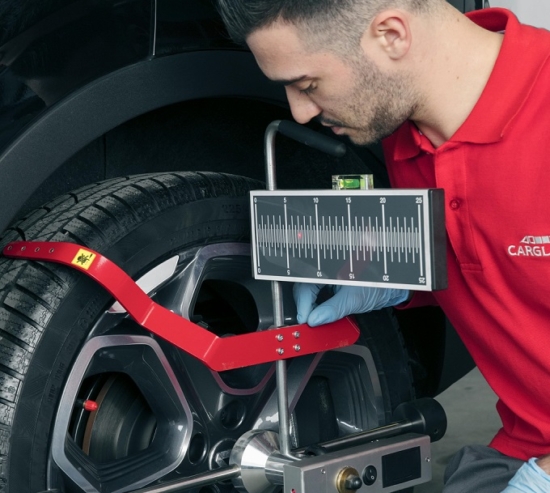Connected cars: Market worth 1.8 billion euros in 2020, ADAS accounts for a third
 ADAS – technology that needs calibration throughout its service life – is the largest part of the connected and intelligent car solutions market, the Connected Car & Mobility Observatory of the School of Management of the Politecnico di Milano (Photo: CarGlass)
ADAS – technology that needs calibration throughout its service life – is the largest part of the connected and intelligent car solutions market, the Connected Car & Mobility Observatory of the School of Management of the Politecnico di Milano (Photo: CarGlass)
During the pandemic year 2020, connected and intelligent car solutions reached a value of 1.8 billion euros. A third of the market is represented by ADAS systems (Advanced Driver Assistance Systems, equating to 600 million euros). The largest segment is constituted by so-called solutions for the connected car, which in 2020 slowed down to 1.18 billion euros (-2%), after having grown in double figures during both 2018 (+ 31%) and in 2019 (+ 14%). Similar trends can be seen across Western countries, which oscillate between -5 per cent and + 5 per cent.
The most popular connected car solutions are GPS/GPRS boxes for locating and recording driving parameters for insurance purposes (55 per cent of the market, down -11 per cent), but natively connected cars are the main drivers of the market via SIM (18 per cent, up 8 per cent) or with bluetooth systems on board the vehicle (27 per cent, + 5 per cent). The component of services that exploit the data collected from connected cars is also growing, worth 340 million euros (up 3 per cent), according to research carried out by the Connected Car & Mobility Observatory of the School of Management of the Politecnico di Milano, presented during the “Connected Car & Mobility: how to rewrite the mobility of the future” online conference which took place at the end of May 2021 and focused on trends in the Italian market and has been reported by our colleagues at our Italian sister publication PneusNews.it.
“Despite the collapse of the car market in 2020, solutions for the smart and connected car have withstood the brunt of the pandemic, marking only a slight decline, offset by the growth of connected vehicles circulating in Italy and the components of the more innovative, such as the services enabled by the data collected by smart cars, said Giulio Salvadori, director of the Connected Car & Mobility Observatory, who added: “The ferment of the market is witnessed by the many innovations that cross the sector, such as the new business and pricing models based on the enhancement of data and the technological evolution driven by 5G and autonomous driving systems, as well as by the numerous benefits that Smart cars can generate for consumers, businesses and society as a whole, from greater safety to the reduction of greenhouse gas emissions, from customized insurance policies to the optimization of company fleet management “.
As well as increased safety options, another opportunity offered by ADAS systems is the possibility of taking out insurance policies in which the premium varies based on how many and which of these systems are present in the vehicle. The observatory estimates that for a car equipped with ADAS systems with a engine between 1,300 and 1,800 cc and with an initial premium of 170-200 euros per year, it is possible to reduce the risk of accidents by 15 -20 per cent.
Connected cars also allow fleets to plan maintenance interventions in advance, saving time and costs, limiting cases of fraudulent use (for example, the use of company vehicles for personal rather than business purposes) and encouraging a more responsible style of driving (limiting accident rates and fuel consumption). Considering a five-year period, the Observatory estimates for the transition to a fleet of connected cars a Net Present Value of over 3,000 euros in the case of a small business and 48,000 euros in the case of a medium-sized company, with a payback time of two and three years respectively.
Smart Car data market already worth $4 billion
With the growing diffusion of connected cars, companies begin to see the potential linked to the data they can collect and make available. A market that globally, according to ResearchMarket, is already worth $4 billion dollars, considering only the data coming from smart cars, and which will grow further in the coming years. Some examples of exploitation of data collected from connected cars are Smart Road projects, where drivers can choose to pay an additional fee to use a dedicated lane and avoid traffic; the possibility offered by vehicle manufacturers to pay for certain car features only when they are used, thanks to the data communicated by the car.
“Companies are increasingly defining strategies to enhance the data collected by smart cars and adopt new pricing models that involve the purchase of smart services related to cars or roads or pay-per-use methods”, says Giovanni Miragliotta , Scientific director of the Connected Car & Mobility Observatory. In the coming years, the development of the Connected Car will no longer depend only on the growing diffusion of connected cars or their traditional functionality, but also on the possibility of thinking of cars as an “intelligent” sales channel to bring innovative services or even functionality to the customer. of advanced and unlockable products for a fee, such as extending the battery life of an electric car or upgrading the engine “.

 Kenda
Kenda
Comments